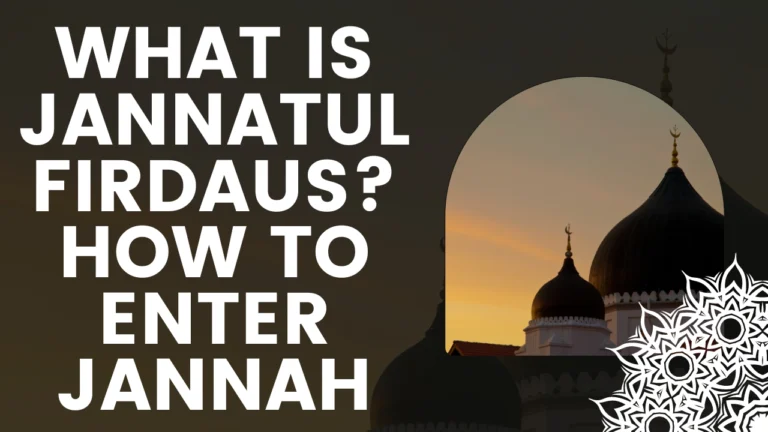Jannatul Firdaus represents the pinnacle of the Islamic concept of paradise, often referred to simply as Jannah. In essence, Jannah is the promised garden and ultimate abode of peace for believers, akin to the idea of Heaven in other faiths.
The Quran offers vivid depictions of Jannah’s splendour, but it also acknowledges that its true essence and beauty are beyond human comprehension. A profound verse, Surah Ar Ra’d 23-24, encapsulates this: “Gardens of perpetual residence; they will enter them with whoever were righteous among their fathers, their spouses and their descendants. The angels will greet them at every gate, saying, ‘Peace be upon you for your patience. You’ve earned a great final home!’
The Meaning of Jannah Al-Firdous
The term “Jannah” translates to “garden” in Arabic, while “Firdaus” denotes “paradise.” Collectively, Jannatul Firdaus signifies the highest level of Paradise, where the revered Prophet Muhammad (peace be upon him) is believed to dwell. This tiered concept of Heaven in Islamic theology posits that Jannah is enriched by varying degrees of spiritual fulfilment, with Firdaus standing supreme.
Insights from Hadith: The Layers of Heaven
Hadith literature sheds light on the hierarchical nature of Paradise. For instance, a narration by Abu Huraira highlights the Prophet’s teachings on achieving a place in this exalted realm, indicating that believers who uphold their faith through prayer and fasting are promised entry into Paradise.
Furthermore, the tiers of Jannah are expansive; each level boasts its own profound distance, underscoring the significance of striving for the highest abode. The Prophet advised believers to earnestly seek Al-Firdaus, noting that above it lies the Throne of Allah, from which the rivers of Paradise flow.
Pathway to Jannatul Firdaus
To gain access to Jannatul Firdaus, one must embody righteousness and devotion. The Quran states that believers who perform good deeds will be welcomed into Paradise without injustice. Acts such as worshiping Allah without associating partners with Him, engaging in charity, maintaining kinship ties, and seeking knowledge are fundamental.
Visiting the sick also garners special rewards, elevating the visitor’s status in Jannah. The teachings of the Prophet reinforce the importance of community, kindness, and sincerity in actions, all of which contribute to one’s journey towards eternal bliss.
The Essence of Jannatul Firdaus in Daily Life
The applications of the concept of Jannatul Firdaus extend into daily life, as demonstrated in the expressions of love and hope within the Muslim community.
Phrases such as “May Allah grant our mothers Jannah Al-Firdaus” and prayers for guidance and mercy reflect a profound yearning for divine grace and a yearning for the ultimate reward in the hereafter. Each sentiment reinforces not only a belief in the afterlife but cultivates a culture of remembrance, gratitude, and spiritual aspiration.
Jannatul Firdaus in Arabic
In Arabic, جَنَّةُ الْفِرْدَوْسِ (Jannatul Firdaus) encapsulates the essence of this celestial abode. The formulation of the phrase highlights its revered position, and it is often invoked in prayers and supplications, particularly when seeking mercy for deceased loved ones.
Jannatul Firdaus in the Quran
Several verses in the Quran elaborate on the beauty and rewards of Jannatul Firdaus. One notable verse is from Surah Al-Ra’d (13:23-24), which depicts the privilege of entering this magnificent abode alongside righteous ancestors and loved ones. Furthermore, Surah Al-Kahf (18:107) asserts that those who believe and perform good deeds are destined for the Gardens of Paradise, indicating the intimate connection between faith and entry into this heavenly realm.
Jannat ul Firdous Dua
Muslims often recite specific duas (supplications) to request admission to Jannatul Firdaus, especially for the deceased. The phrase “May Allah grant him Jannatul Firdaus” encapsulates the hope that loved ones will receive the ultimate reward in paradise.
Jannah Al-Firdaus Quotes
Numerous quotes emphasize the aspiration for Jannatul Firdaus, serving as a reminder of the spiritual goals in life. One powerful Hadith states that the Prophet Muhammad (peace be upon him) urged followers to seek Al-Firdaus, the best and highest part of Paradise, as this is where the Throne of Allah is located and where the rivers of Paradise flow.
Meaning of Jannah Al-Firdous
The literal definition of Jannah is “garden,” while Firdaus signifies a “paradise.” This terminology implies not just a physical space, but a state of sublime existence that embodies peace, joy, and love in the presence of the Divine, exceeding the limitations of earthly experiences.
Jannatul Firdaus Pronunciation
The pronunciation of Jannatul Firdaus is /ˈdʒænətuːl fɪrˈdaʊs/, with an emphasis on the flowing vowel sounds that characterise the Arabic origin.
Jannatul Firdaus Dua for the Dead Person
In Islamic tradition, observing the rituals connected to the deceased often includes heartfelt supplications for their admission into Jannatul Firdaus. These duas signify love, remembrance, and the hope for lofty rewards in the afterlife, offering solace to the bereaved.
How to Enter Jannatul Firdaus
Entering Jannatul Firdaus requires adherence to certain principles and actions, as highlighted in various Quranic verses and Hadith:
- The Righteous Will Enter Jannah: Those who perform righteous deeds without prejudice, as stated in Surah An-Nisa (4:124), shall find their place in Paradise.
- Do Not Associate Partners and Maintain Charity: The Prophet Muhammad (peace be upon him) guided that the essence of worship includes recognizing the oneness of Allah, performing prayers diligently, and engaging in acts of charity.
- Knowledge is Essential: The pursuit of knowledge is highly encouraged within Islam, as it is a pathway that facilitates entrance into Paradise.
- Compassionate Acts: Visiting the sick and performing acts of kindness toward others are also encouraged behaviours that can lead to Jannatul Firdaus.
In summary, the quest for Jannatul Firdaus transcends mere understanding; it embodies a believer’s lifelong effort to cultivate good deeds, foster relationships, and grow spiritually, ultimately aiming for a place in the highest garden of paradise.

